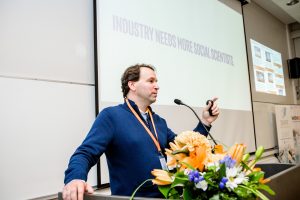Peter Levin – A Social Science Agenda
Peter Levin: A Social Science Agenda for the Technology Economy
The second keynote speaker of the day, Intel Corporation’s Strategist and Senior Research Scientist Peter Levin, also continued on the social science path. In his speech, he focused on the role of the social sciences in the technology economy. Levin himself moved to work for Intel from his academic career four years ago, and his message to the scientific community was clear:

“Industry needs more social scientists”, he stated.
According to Levin, many phenomena related to the technology economy, such as the concentration of power, digitalisation and networking demand the engagement of social science.
“The way in which the global economy creates value is undergoing a major change. I suspect that we are underestimating the power of this change and do not understand its effects.”
Social scientists should seek to understand, critically evaluate and demonstrate interest in the technology economy. It is a change that has implications for all aspects of society.
Levin thinks that scientists interested in the technology economy should consider three things. Firstly, problems cannot be pointed out if you are not ready to provide solutions to them. Secondly, it must be possible to connect research related to the subject to actual uses, design principles or market opportunities.
“You can get a software designer to do what you want when you understand what he is doing”, Levin said.
Thirdly, researchers should consider switching from their academic careers to the technology economy. According to Levin, it is difficult to keep an appropriate distance if you are working on the science side but at the same time trying to influence the technology economy.
“It would be good if the ecosystem of social scientists were larger. It requires that some of you leave behind the comfortable conditions of academia.”
With thanks for the text to our partners at the SWiPE project
